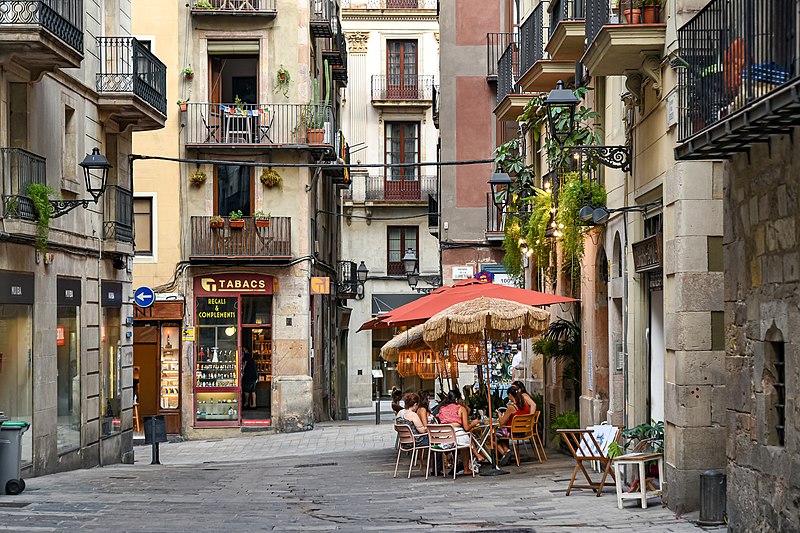
Spain, with its efficient transportation network and a wide range of hostels and budget accommodations, is perfectly suited for an adventure-filled, liberating journey.
Backpacking in Spain is an experience that allows you to discover the country authentically, following a flexible itinerary that can be adapted to your needs.
Beyond Madrid and Barcelona, you can visit other destinations that attract millions of travellers each year thanks to their artistic and cultural heritage and the lively atmosphere that characterizes them.
Madrid: The Ideal Starting Point
Madrid, the most visited city in Spain, is the perfect starting point for a backpacker itinerary.
The Spanish capital, with its efficient transport system and an array of affordable accommodations, makes the city accessible even for those traveling on a tight budget.
Among the main attractions, the Prado Museum and the Royal Palace are must-sees, but there are also many places to discover by simply strolling around, such as the neighbourhoods of Malasaña and La Latina, which offer a vibrant and authentic atmosphere without spending too much.
For nature lovers, the Retiro Park is the ideal spot for a relaxing walk.
When it comes to lodging, Madrid offers economical options, including hostels and guesthouses, which are perfect for those looking for a place to stay without compromising the experience.
Additionally, local markets and tapas bars provide an excellent way to savour Spanish cuisine at a low cost.
Andalusia: Landscapes and Traditions
Andalusia is the ideal destination for those looking for a mix of history, culture, and natural landscapes, all in a relaxed atmosphere.
Seville, with its Alcázar Palace and Cathedral, is perfect for immersing yourself in history, but the true Andalusian experience is found in the narrow streets of Triana and the markets where you can sample local food.
Granada and its imposing Alhambra are another focal point, yet there is much more to do: strolls through the Albaicín neighbourhood and mountain walks in the Sierra Nevada will allow you to enjoy nature without high expenses.
If you’re traveling with just a backpack, Malaga is an excellent starting point: you can find a good selection of budget hostels and beautiful beaches to relax on after a day of exploration.
Don’t forget to climb the Castillo de Gibralfaro for a panoramic view of the city and the coast.
Valencia
Valencia is one of the cities best suited for backpacking, thanks to its blend of modernity and tradition.
With its waterfront and the City of Arts and Sciences, it is a great place to explore without spending too much.
The central market and the squares of the historic centre are perfect for stopping to eat and savour the local dishes.
Valencia’s beaches are easily accessible and are the ideal spot for a day of relaxation without high costs.
In Valencia, you can find several options for hostels and affordable room rentals.
Benidorm and Alicante, just a short distance from Valencia, are excellent choices for those looking for a seaside break at reasonable prices.
Barcelona: Between History and Beaches
Barcelona is one of the most famous and visited destinations, but with proper planning, a city visit can also remain budget-friendly.
Parc Güell and the Sagrada Familia are unmissable, but if you’re a backpacker, you can also enjoy many free activities, such as wandering around the Gothic Quarter or strolling along the city beaches.
Barcelona is a great place to relax without spending too much, and the Port Olímpic beaches are less crowded and ideal for those seeking tranquility.
For accommodation, Barcelona offers a wide range of budget hostels, especially in central neighbourhoods like El Raval and Gracia, where you can easily socialize with other backpackers.
The city is also well-connected by public transportation, so moving between major attractions will be simple and convenient.
Northern Spain: Nature and Tranquility
If you prefer a more relaxed experience immersed in nature, northern Spain is the right choice.
Asturias and Cantabria are perfect for those who love hiking and being close to nature. The beaches of the Costa Verde are ideal for those seeking some tranquility away from the tourist crowds.
Santiago de Compostela, in Galicia, is an ideal destination for those who want to walk part of the Camino de Santiago, which attracts thousands of pilgrims and backpackers every year.
The mountainous regions offer trails and landscapes to explore without having to spend a fortune.
Hostels in these areas are affordable, and you can enjoy a quieter atmosphere compared to the major cities.
Practical Tips for a Backpacking Trip in Spain
Getting around in Spain is easy thanks to the public transport network.
The high-speed rail system connects the main destinations, but if you have a limited budget, buses are an economical alternative.
Hostels are the best option for those seeking budget lodging, but you might also consider guesthouses or small apartments if you desire more privacy.
Regarding cuisine, Spain is rich in local dishes that you can enjoy at reasonable prices, especially in markets and traditional restaurants.
How Much Does Backpacking in Spain Cost?
Backpacking in Spain can be very affordable if planned correctly.
With a limited budget of about 50 EUR per day, you can sleep in hostels, prepare your own meals, and use public transportation.
By taking advantage of free activities such as city walks and beach days, you can discover new places without spending too much.
With a budget of around 130 EUR per day, you can opt for more comfortable accommodations, such as private rooms or apartments, and add activities like museum visits or gastronomic tours.
In this case, you’ll also have more freedom in transportation, using taxis or other means of getting around.
(pic by Jorge Franganillo under creative commons licence)



















Recent Comments